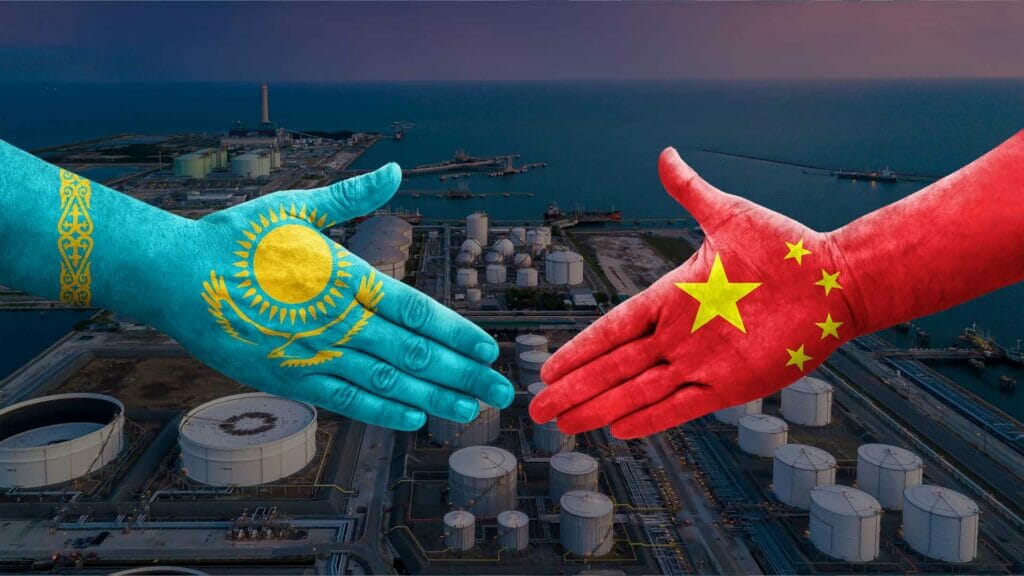China and Kazakhstan to expand cooperation in energy sector

KazMunayGas (KMG) and QazaqGaz are going to strengthen their cooperation with CNPC, a national oil and gas company in China, in the sphere of exploration, refinery and transportation of oil and gas within Kazakhstan, according to Samruk Kazyna, the parent company for both Kazakhstani entities.
«The two companies are going to expand their cooperation with the Chinese oil company thanks to agreements President Kassym-Jomart Tokayev has signed in Xian during his official trip to the PRC,» the holding said in a statement on May 18.
China National Petroleum Corporation (CNPC) has been operating in Kazakhstan for years. The company controls an 8.33% share in the Kashagan project, a 50% stake in MangistauMunaiGaz and 67% in PetroKazakhstan Inc. CNPC also took part in the construction of the Kazakhstan-China oil pipeline, Kazakhstan-China gas pipeline and the Beineu-Bozoy-Shymkent gas pipeline.
As Samruk Kazyna reported, the new agreements imply expanding cooperation between KMG and QazaqGaz with CNPC in the spheres of exploration, refinery and oil and gas transportation within Kazakhstan. For example, the two sides plan to expand the Kenkiyak-Atyrau pipeline, which is a section of the Kazakhstan-China pipeline, to build a second line of the Beineu-Bozoy-Shymkent gas pipeline, and boost joint efforts on oil and gas exploration.
Russian Rosneft has been exporting oil to China through the Priirtyshsk-Atasu-Alashankou pipeline, which stretches across East Kazakhstan. Kazakhstan redirects part of the Russian oil to the Pavlodar oil refinery, which was designed to use light oil from Siberia back in the Soviet era, by compensating that amount of oil with its own product it sends to China.
In 2013, Russia and Kazakhstan reached an agreement to transport seven million tons of Russian oil toward China via Kazakhstan. In 2014, they agreed to expand oil transport to 10 million tons. The agreement between KMG, KazTransOil and Rosneft was expected to expire in 2023 but it has been extended to January 1, 2034.
The Kazakhstan-China oil pipeline consists of two parts: the Kenkiyak-Atasu-Alashankou section with a capacity of 20 million tons of oil per year toward China and the Kenkiyak-Atyrau section with a capacity of six million tons of oil per year. It transports oil toward the Atyrau refinery and the system of export pipelines controlled by Russian Transneft via the Atyrau-Samara pipeline and the Caspian Pipeline Consortium.
Between January and April 2023, KazTransOil made a transit of 3.2 million tons of Russian oil to China. The cost of the transit hasn’t changed since 2019 and is at $15 per ton (VAT is excluded).
In May 2022, Kazakhstan’s Prime Minister Alikhan Smailov said that the cabinet was planning to expand the capacity of the Atyrau-Kenkiyak-Kumkol pipeline from six million tons per year to 12 million tons. He made this statement in response to an inquiry by an MP. Smailov also said that even though the Kazakhstan-China oil pipeline is capable of transporting 20 million tons of oil per year, it is currently transporting only 11.5 million tons.
According to Arman Kassenov, deputy head of QazaqGaz, the second line of the Beineu-Bozoy-Shymkent gas pipeline will have a capacity of 16 cubic meters of gas per year. The new line is expected to start operation in 2026 or 2027.
«We are currently preparing the feasibility study for the project. Later, we will develop a design of the pipeline and build it alongside the current pipeline from Beineu to Shymkent. The new line is going to have the same capacity as the first one – 15 billion cubic meters,» he told Kursiv.Media.
He also noted that all the project details including deadlines and costs must be negotiated with the Chinese side. QazaqGaz and CNPC have equal shares in the current gas pipeline.
«QazaqGaz controls the Beineu-Shymkent pipeline along with CNPC. We have our internal plans that require the construction of the line to be completed in 2026 or 2027,» Kassenov said.
In order to provide its Southern regions with natural gas, Kazakhstan has been closely cooperating with Uzbekistan, which sends its gas to Southern Kazakhstan via Karakalpakstan. In turn, Kazakhstan supplies gas to Tashkent, the capital city of Uzbekistan. This arrangement was extended to 2025 during the official visit of Tokayev to Tashkent in December 2022.
Now, Kazakhstan should ensure that the second line of the Beineu-Shymkent pipeline is ready by 2026. At the initial stage, this new line will have a capacity of four billion cubic meters of gas per year. Once all planned compressor plants are built, the new line’s capacity will expand to 15 billion cubic meters of gas.
The first who came up with the idea of expanding the Beineu-Bozoy-Shymkent pipeline was Bolat Akchulakov, former minister of energy. On February 22, 2023, he suggested preparing a feasibility study for the project. In April, he resigned from the office and Almasadam Satkaliyev took charge as the new minister.

